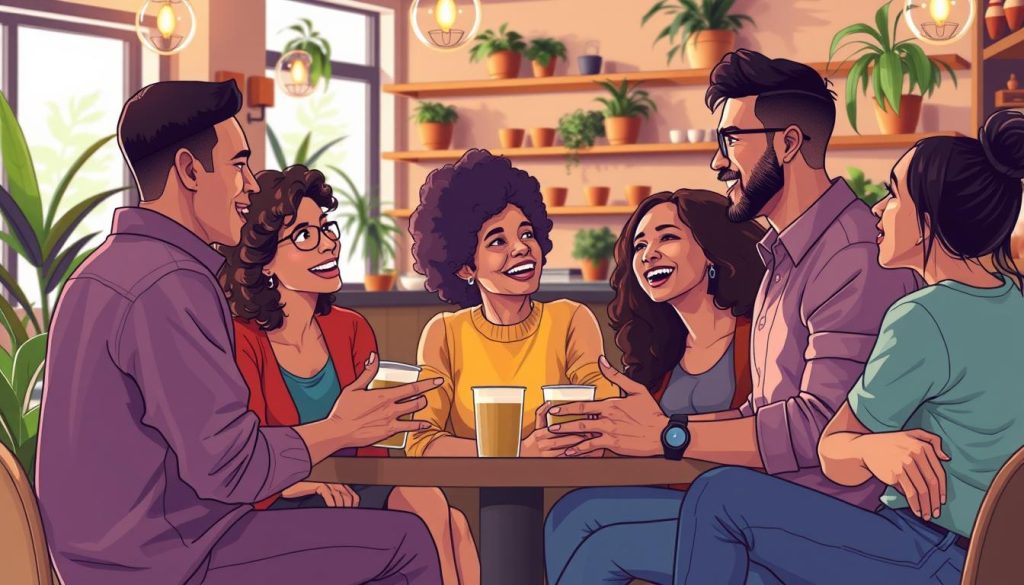Mastering Social Life Tips: Your Guide to Better Connection
Building real and lasting social bonds is key in today’s fast world. Deep connections are vital for our mental health, career success, and happiness. This guide offers practical tips to boost your social skills, gain trust, and make lasting connections.
Studies show that strong social bonds make us happier, live longer, and feel less stressed. Good social ties improve our mental and physical health, career, and personal growth.
If you want to grow your social circle, deepen current relationships, or beat social anxiety, this guide has you covered. It teaches the value of social connections and how to communicate well. With these skills, you can create meaningful relationships and live a more joyful, connected life.
Understanding the Importance of Social Life
Strong social etiquette and interpersonal relationships are key to a happy life. They boost our mental and physical health, help us succeed at work, and help us grow as people. Building and keeping these relationships can be tough, but they’re worth it.
Why Social Connections Matter
Good social etiquette and interpersonal relationships greatly improve our well-being. Research shows that older adults with close friends live longer than those without. People with strong social ties also face lower risks of health problems like depression and high blood pressure.
Benefits of Healthy Relationships
- Improved mental health by reducing depression and anxiety through emotional support
- Enhanced physical health, including longer lifespans and better immune systems
- Increased career success through networking and collaboration opportunities
- Encouragement of personal growth as relationships push individuals to develop empathy and learn from others
Even with these benefits, building and keeping social etiquette and interpersonal relationships can be hard. It takes certain skills and strategies. The next parts will talk about how to boost confidence, improve communication, and make meaningful connections.
“Surrounding oneself with a positive social network can boost self-esteem and contribute to a sense of well-being and support during tough times.”
Building Confidence in Social Settings
Overcoming shyness and social anxiety is tough, but doable. Start small to build confidence. Begin by speaking up in places you feel comfortable. Then, step up to more challenging social situations.
Overcoming Social Anxiety
Many face social anxiety, feeling judged or misunderstood. But, you’re not alone. Socializing more can boost your skills and confidence. This can reduce stress and increase happiness.
Meditation and hanging out with confident friends also help. They can manage your anxiety.
Practicing Self-Compassion
Mistakes are common, and we should be kind to ourselves. Seeing mistakes as learning chances can boost self-esteem. Keep track of your social interactions to see how far you’ve come.
Remember, overcoming shyness and anxiety takes time. Interacting with everyone, leading, and finding joy in social situations can help.

“Lack of confidence in social situations affects many people from various walks of life. With the right strategies and self-compassion, it’s possible to overcome social anxiety and thrive in social settings.”
Effective Communication Skills
Good communication is key to strong social bonds. Learning to listen well, speak clearly, and read nonverbal signs can boost your social connections. Let’s explore these vital skills for a better social life.
The Art of Active Listening
Active listening is a vital skill for social success. It means really focusing on the speaker. This includes keeping eye contact, not interrupting, and asking for clarity. Research shows we often miss half of what’s said, making active listening crucial.
Expressing Yourself Clearly
Being clear in your communication is essential. Use open-ended questions to spark deeper talks and share personal stories thoughtfully. Emotional smarts and a plan for talking can also help you get your point across.
Nonverbal Communication Cues
Body language and facial expressions are big in social talks. Nonverbal signs can carry 65 to 93 percent more weight than words. Showing positive signs like nodding and smiling shows you’re interested. Knowing cultural differences in these signs is also key for good communication.
Mastering these skills can make you better at connecting with people. It helps build stronger ties and makes you more confident in social settings. With practice and a desire to learn, you can keep getting better at talking and listening.

“The most important thing in communication is to hear what isn’t being said.” – Peter Drucker
Making New Friends as an Adult
Making new friends as we get older can be tough, but it’s worth it. By finding hobbies and interests we share, we can meet people who think like us. This way, we build a lively social circle.
Finding Common Interests
Identifying your enjoyable hobbies is key to making new friends. Joining a book club, hiking group, or cooking class can help. Talking about what you love can start strong friendships.
Joining Local Groups and Clubs
Getting into local groups and clubs is another great way to make friends. Whether it’s volunteering or playing sports, these places are full of people to meet. They offer a chance to belong and make lasting connections.
“Friendship is a sheltering tree.” – Samuel Taylor Coleridge
While making friends as an adult takes more work, the benefits are huge. By diving into your interests and joining groups, you can enrich your social life. It’s all about being open and finding common ground.

Networking for Personal and Professional Growth
Networking is key for both personal and professional growth. It helps you find new opportunities and grow your career. The most important thing is to be genuinely interested in others and willing to help your network.
Developing Meaningful Connections
Good networking mixes online and offline efforts. Going to networking events, both in person and online, can really help your career. Sites like LinkedIn and Meetup are great for growing your network and keeping up with trends. Always make your messages personal to leave a strong impression.
Leveraging Social Media Platforms
Social media has changed how we network and look for jobs. It’s important to regularly interact with your network and work on building professional relationships. Supporting each other in these connections is vital for everyone’s growth.
Networking isn’t just about collecting contacts. It’s about making real connections and adding value to your network. By sharing ideas, introducing people, and creating your own networking spaces, you can boost your career and reputation.

“Networking is the single most powerful marketing tactic to grow your business.” – Jen Groover, Entrepreneur and Author
Keeping and growing your professional network takes work, but it’s worth it. It can lead to new job chances, partnerships, or just keeping in touch with industry friends. Effective networking can be a big step forward in your career and personal life.
Maintaining Long-Distance Friendships
As we grow older, we often move to different parts of the world. Keeping up with long-distance friends can be tough but rewarding. With a bit of effort and creativity, these friendships can flourish, no matter the distance.
Scheduling Regular Check-Ins
Keeping in touch is key in long-distance friendships. It could be a weekly video call or quick texts. Setting aside time to talk helps bridge the gap. It keeps your bond strong and lets you share life updates.
Creative Ways to Stay Connected
Today, there are many ways to stay close to friends far away. You can have virtual movie nights or play games together online. Sharing moments and making memories together keeps you feeling connected.
Keeping up with long-distance relationships and staying connected with friends takes work. But the joy and benefits are well worth it. By making time for each other and finding new ways to connect, you can build a lasting friendship that knows no bounds.

“Friendships can withstand thousands of miles, showing that they are flexible rather than fragile.” – Anne Moyer, Psychology Professor
Navigating Conflict in Relationships
Conflict is a normal part of any relationship. Learning to handle it well is key to keeping connections strong. It’s about talking openly, finding common ground, and understanding each other.
Addressing Issues Openly
When conflicts come up, staying calm and listening well is crucial. Share your thoughts and feelings clearly, without blaming. Good communication, like listening and empathy, is vital.
Seeking Compromise and Understanding
Instead of blaming, aim to find a solution that everyone can agree on. Compromise and understanding are the keys to solving conflicts. This means respecting each other’s feelings, finding shared interests, and being ready to give in.
In work settings, solving conflicts through mediation helps create a better team environment. Learning to manage relationships well is important in both personal and professional life.
“The greatest weapon against conflict is the understanding that we are all human.” – Mahatma Gandhi
Dealing with conflict in relationships takes patience, empathy, and a real wish to find a good solution. By talking openly and compromising, we can build stronger, more rewarding connections.
The Role of Empathy in Social Life
Empathy is key in our social lives. It lets us understand and share others’ feelings. By putting ourselves in someone else’s shoes, we build deeper connections and show compassion.
Understanding Others' Perspectives
To develop empathy, we must listen well, validate feelings, and try to see things from others’ viewpoints. This helps us talk better and solve problems together.
Building Stronger Relationships Through Empathy
- Empathy makes our connections more meaningful, as we care and understand each other better.
- Practicing empathy through acts of service and exploring different views can improve this important skill.
- In both personal and work life, empathy leads to more rewarding and successful relationships.
By growing our emotional intelligence and empathy, we create stronger, more lasting social bonds. These bonds make our lives and communities better.

“Empathy is about standing in someone else’s shoes, feeling with his or her heart, seeing with his or her eyes. Not only is empathy hard to deliver, but it is harder still to sustain over time and in the face of anger, hurt, and pain.”
– Leslie Kaminoff
Tips for Enhancing Your Social Life
To improve your social life, set clear goals and keep a balanced schedule. Having social objectives, like meeting new people or trying new activities, helps you build meaningful connections. Also, a balanced social calendar prevents your social life from taking over other important parts of your life.
Setting Social Goals
Investing in your relationships is key to your happiness. Setting social goals keeps you focused and motivated. This could mean going to networking events, joining clubs, or staying in touch with loved ones. Remember, building strong social skills takes time and effort.
Keeping a Balanced Social Calendar
It’s crucial to balance your social life with work and personal time. Manage your time well to have enough energy for all areas of your life. Tips include staying informed on current events, using polite language, and practicing social skills. This balance helps you enjoy your social life without neglecting other important areas.


